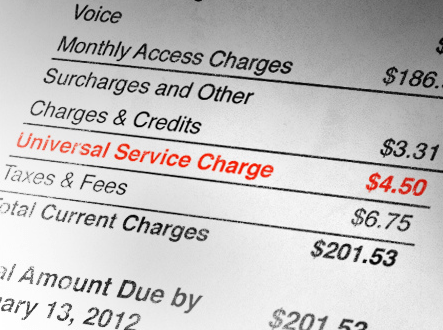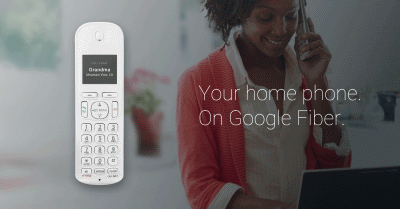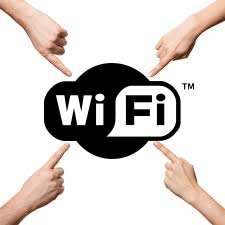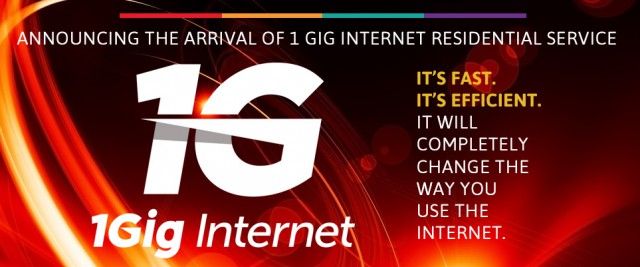
The Universal Service Fund is funded by telephone ratepayers. (Image: Free Press)
A $9.25 a month subsidy to allow low income Americans to get basic telephone service would be expanded to include broadband service if a majority of FCC commissioners adopt changes proposed today to the Lifeline program.
A draft plan to expand the 30-year old Lifeline federal subsidy intended originally for landlines to include Internet access was released this morning by FCC chairman Thomas Wheeler and Commissioner Mignon Clyburn. Under the proposal, those eligible for federal aid programs like Medicaid will qualify for a discount, which can be applied to a landline, mobile phone, or broadband service.
“Internet access has become a prerequisite for full participation in our economy and our society, but nearly one in five Americans is still not benefiting from the opportunities made possible by the most powerful and pervasive platform in history,” Wheeler and Clyburn wrote in a joint blog post. “Internet access has become a pre-requisite for full participation in our economy and our society, but nearly one in five Americans is still not benefiting from the opportunities made possible by the most powerful and pervasive platform in history. […]By modernizing the FCC’s Lifeline program, we will do better.”
Republicans immediately pounced on the proposed program, claiming past experiences with waste, fraud, and abuse in FCC programs for the poor have already cost ratepayers a great deal of money subsidizing unqualified consumers with multiple landlines and cell phones. They propose not expanding the program further until more safeguards were put in place to prevent more fraud.

Wheeler
Wheeler and Clyburn appeared ready for that objection, noting the plan would set up an independent clearinghouse to manage customers’ eligibility and approval, removing that responsibility from providers that critics charge have a vested interest in approving as many new customers as possible.
But some still object to the plan, noting Lifeline’s original purpose has been dramatically altered since it was first conceived in 1985 as a program to guarantee low-cost landline service for poor Americans, and efforts to justify its relevance by expanding it to include cell phones allowed fraudsters to game the system.
After the Bush Administration approved a plan to expand Lifeline to include wireless phone subsidies, providers sprung up almost immediately offering free or low-cost cell service using a business plan based entirely around the federal subsidy. Many providers signed up customers later found to be ineligible for service because they already received subsidized landline or mobile service from another provider. Getting rid of duplicate or ineligible accounts took almost four years in some cases.
Today, about 12 million American households receive the $9.25 subsidy. Federal officials estimate up to five million more households will eventually apply for the broadband subsidy, which would boost the Lifeline budget from $1.5 billion to $2.25 billion. The program is funded by telephone ratepayers, as part of the Universal Service Fund surcharge on consumers’ phone bills. For Mr. Wheeler and Ms. Clyburn, the cost is well worth it.
“We can recite statistics all we want, but we must never lose sight of the fact that what we’re really talking about is people – unemployed workers who miss out on jobs that are only listed online, students who go to fast-food restaurants to use the Wi-Fi hotspots to do homework, veterans who are unable to apply for their hard-earned benefits, seniors who can’t look up health information when they get sick,” the two FCC officials wrote.
As a practical matter, the $9.25 subsidy would likely most benefit customers enrolled in voluntary Internet discount programs offered by some cable and telephone companies, often at prices ranging from $9.95-$15 a month. Some skeptics believe the program will prove of limited benefit where Internet service costs $40+ a month. The cost of service is the biggest barrier for low-income Americans. The FCC estimates fewer than half of households with incomes less than $25,000 annually have Internet access at home. Reducing the bill to $30 a month may not be enough.
The proposal is expected to win approval on a future party line vote at the FCC — three Democrats in favor, two Republicans opposed.
 Although tens of millions of Americans have pulled the plug on landlines in favor of their mobile phones, there is still a market for affordable landline phone service, especially if you hate talking on cellphones.
Although tens of millions of Americans have pulled the plug on landlines in favor of their mobile phones, there is still a market for affordable landline phone service, especially if you hate talking on cellphones.

 Subscribe
Subscribe Frontier Communications CEO Dan McCarthy blames slow Internet connections on your lousy home Wi-Fi network, not on his company’s broadband service.
Frontier Communications CEO Dan McCarthy blames slow Internet connections on your lousy home Wi-Fi network, not on his company’s broadband service. Frontier Communications has promised to commit additional investment to expand and improve broadband after it completes its purchase of Verizon landlines in Florida, California, and Texas. Copper DSL customers may eventually get 25Mbps service, fiber customers up to 1Gbps. But the speed improvements have not been as forthcoming in Frontier’s original service areas, dubbed “legacy territories.”
Frontier Communications has promised to commit additional investment to expand and improve broadband after it completes its purchase of Verizon landlines in Florida, California, and Texas. Copper DSL customers may eventually get 25Mbps service, fiber customers up to 1Gbps. But the speed improvements have not been as forthcoming in Frontier’s original service areas, dubbed “legacy territories.”


 The local hero? Rep. Art Swann (R-Maryville) who voted yes (
The local hero? Rep. Art Swann (R-Maryville) who voted yes ( Mediacom, perennially rated America’s dead-last cable company by Consumer Reports’ annual subscriber surveys, will invest $1 billion over the next three years to combat increasing competition from AT&T and other telephone companies by improving its broadband service.
Mediacom, perennially rated America’s dead-last cable company by Consumer Reports’ annual subscriber surveys, will invest $1 billion over the next three years to combat increasing competition from AT&T and other telephone companies by improving its broadband service.




